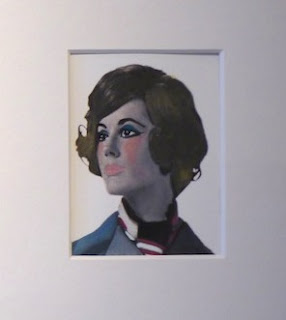Walking the stairs to
Tintype gallery a murmuring chatter gradually comes into earshot. Several people
are talking at once, their voices overlapping. They are not, however, vying for
attention; their speech is hushed and their words intimate. ‘I was an only
child’, says a subdued male voice. ‘Something ambitious in me, and yet I
crack.’
 |
| Photo Cameron Leadbetter |
Entering the gallery, the
owners of the voices come into view. A lady with wispy ginger hair is slumped
in the corner of the room, unable to get up, her long arms flung high above her
head. She wears a lurid dress of orange, green, yellow, and red, and an equally
garish hat of purple and blue. The fanciful attire is made from fluorescent
vinyl sheeting; her arms, simple wooden planks coated in coloured packing tape;
and her face and feet, bunches of pink tissue paper. A tangle of multi-coloured
cables sprouts from her hip. They are attached to a car radio. This is the
source of her voice.
Next to her is another
woman. She is standing, though only just; she leans forwards, propped up
against the gallery wall by her oversized wooden arms. Auburn hair spills forward
from under a vivid green cape, and at its bottom, orange and green legs
protrude to meet turquoise high heels. Her angle is such that the heels of the
shoes are lifted from the floor. It seems that perhaps she has had too much to
drink, and has stopped to throw up, but there’s no one to hold her hair. ‘It’s
a tender process after betrayal; things can easily shatter again’ she says.
 |
| Photo Cameron Leadbetter |
A figure seated on the floor
begins to speak in a male voice. ‘Something about our similarity reassures me.’
A lumpen heap of paper and synthetic hair implies the form of a body out of
which sprout two stubby plaster legs. ‘Something
holds me back’, he says. ‘What is it? Oh yes: criticism.’
The voices form a chorus,
though, rather than a group joining in homophony, they diverge and intertwine,
like many private prayers spoken simultaneously. Just as the simply constructed
figures find themselves on display, compromised and dishevelled, so the voices
express aloud an imagining of a silent everyday chorus. Hushed internal
monologues from a secret inner-life, very much present, but usually unspoken.
Travis Riley













